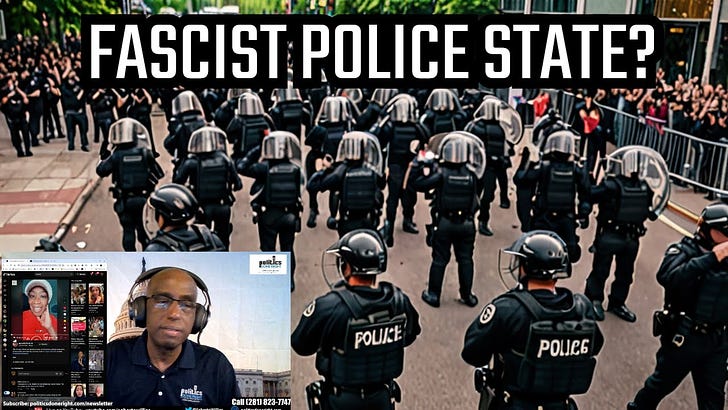Police reaction to university ceasefire protests shows our path to fascism & Joy-Ann Reid nails it!
A recent TikTok post from Joy-Ann Reid pointed out that the police and university leadership reaction to the student/professor ceasefire protests is our path to fascism.
Fascism: Police reaction to student ceasefire protests
Law enforcement’s response to university protests advocating for the cessation of financial support to companies complicit in injustices abroad has sparked a significant debate about the trajectory of civil liberties in the United States. The alarming intensity of police reactions to these protests, as observed recently at Emory University and the University of Texas, echoes historical episodes of state resistance against civil disobedience but with a markedly more draconian undertone. This resurgence of aggressive policing strategies, as articulated by commentators like Joy-Ann Reid, signals a distressing march towards a more authoritarian governance model, reflective of a broader, more conservative MAGA agenda that threatens the foundational principles of democracy in America.
The scenes at these universities are not isolated incidents but are part of a pattern of increasing governmental intolerance towards dissent. The arrest of two college professors during a pro-Palestinian Gaza protest at Emory University starkly illustrates this trend. These professors were not merely participants in academic debate but are now symbols of the state’s readiness to suppress academic freedom and civil rights under the guise of maintaining order. Such actions are a chilling reminder of the state’s potential to exercise its power over its constituents, suppressing dissent through force rather than engaging with the substance of the protest.
This trend is particularly concerning given the historical context of university protests in the United States. The 1980s anti-apartheid protests at the University of Texas, which were part of a larger movement that successfully pressured institutions to divest from South Africa, are a case in point. Unlike today, these protests were met with a more measured police response, facilitating a relatively peaceful yet powerful expression of collective dissent. The shift in police response observed today—marked by a more militarized, aggressive approach—suggests a departure from this precedent towards a more suppressive enforcement strategy.
Joy-Ann Reid’s commentary on these events underscores the potential consequences of this shift. Her analysis draws a direct line between the actions of local law enforcement and the broader political rhetoric championed by the MAGA movement, which valorizes strongman tactics and authoritarian governance. Reid warns that the policies enacted in “red states,” characterized by stringent protest crackdowns, could become a national norm if the political tide does not change. Her critique extends beyond the immediate issue of protest suppression to encompass a wider concern about the erosion of democratic norms and civil liberties under a future autocratic regime.
The involvement of a diverse group of students in these protests—spanning various religious, ethnic, and racial backgrounds—also highlights the universal appeal of the principles at stake: freedom of speech, human rights, and social justice. This diversity underscores the non-partisan nature of the issues being protested and the broad societal concern over the direction in which current enforcement practices are heading.
Moreover, the intersection of these protests with broader political themes, such as opposition to abortion bans, LGBTQ+ harassment, and book bans, illustrates the extensive scope of the rights and freedoms under threat. These are not merely academic or abstract concerns but are immediate and pressing issues that affect a wide swath of the American populace across political and demographic lines.
Commentators like Joy-Ann Reid discuss the forceful police reactions to university protests, which serve as a barometer for the health of democratic engagement in the United States. They reflect a worrisome trend towards authoritarianism, driven by a political agenda that seeks to quash dissent and curtail civil liberties. This trajectory poses a fundamental challenge to the democratic ethos of the nation, necessitating vigorous public discourse and active engagement from all sectors of society to redirect the current path and preserve the foundational democratic principles vital for a free society.
Please support our values via Independent Media.
The other side has big donors and everyday citizens who invest heavily in platforms that lie and misinform. All we have is you. So, please invest in our media outlet by clicking the subscribe button below to become a paid subscriber. You won’t miss that coffee, but it will make a difference in our politics as we spread the truth about our policies and progressive politics. All paid subscribers get to read my five books on this platform and all subsequent books I write. They will also be privy to subsequent incentives.






